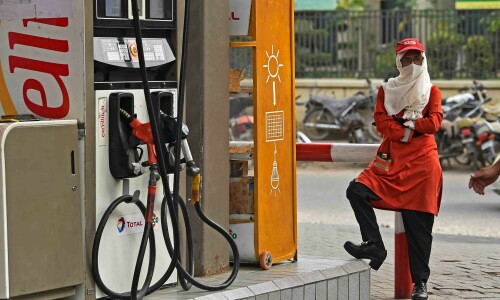ISLAMABAD: A day after jacking up the prices of petrol and diesel, the caretaker government on Friday increased the price of liquefied petroleum gas (LPG) by 19.4pc, pushing up the cost of a domestic cylinder by Rs460 for the current month.
Pakistan Railways followed suit, raising passenger fares by 5pc. This was the second increase in a month.
In a notification, the Oil and Gas Regulatory Authority (Ogra) set the price of LPG at Rs240.2 per kg for September against Rs201.2 in August, up by Rs39 per kg.
Therefore, the price of a domestic LPG cylinder, weighing 11.8kg, has been increased to Rs2,833.49 for the current month against Rs2,373.64 in the previous month, an increase of Rs460.
The price of a commercial cylinder (45.4kg) has jumped by Rs1,170 to Rs10,905 for September against Rs9,135 in August.
Ogra attributed the hike in LPG prices to the rupee’s depreciation and the fuel’s higher price in the Saudi market.
The LPG price was raised because the producers’ price was linked to Saudi Aramco’s contract price for the fuel and the US dollar exchange rate, the regulator said.
It said that compared to the previous month, Saudi Aramco’s contract price had risen 19.8pc and the average dollar exchange rate had gone up by 4.5pc, increasing the LPG consumer price.
As per Ogra’s calculation, the producers’ price of LPG (propane 40pc and butane 60pc) has been determined at Rs163,828 per tonne, including an excise duty of Rs85 per tonne. Therefore, the producers’ price for the 11.8kg cylinder was worked out at Rs1,933 instead of Rs1,543 last month.
With the addition of Rs4,669 per tonne of petroleum levy and 18pc (Rs30,330 per tonne) general sales tax, the maximum producer price was worked out at Rs198,826 per tonne for September, against Rs159,886 per tonne in August. The maximum producer price for a domestic cylinder of 11.8kg was calculated as Rs2,346 per kg instead of Rs1,886 earlier.
For consumer price, another Rs35,000 per tonne of marketing, distribution and transportation margin was added to the maximum producer price besides another 18pc GST (Rs6,300 per tonne on this margin).
Thus, the consumer-end maximum LPG price was fixed at Rs240,126 per tonne or Rs2,834 per 11.8kg of domestic cylinder. The new prices will remain effective until Sept 30.
Train fares up
Meanwhile, Pakistan Railways increased passenger fares by 5pc, a second hike within a month, according to a Samaa TV report.
Railways officials have attributed the ticket price hike to rising diesel costs.
On Aug 16, Pakistan Railways notified a 10pc increase in fares of all mail/express, intercity, shuttle, passenger trains and saloons.
Separately, the Human Rights Watch has proposed that the IMF and the Pakistan government should undertake a thorough assessment of the impact of phasing out subsidies in order to ensure removing fossil fuel subsidies promotes rather than erodes rights.
The HRW stated that prior to phasing out the subsidies, the IMF and the government should put in place a comprehensive reform plan.
Published in Dawn, September 2nd, 2023














































Dear visitor, the comments section is undergoing an overhaul and will return soon.